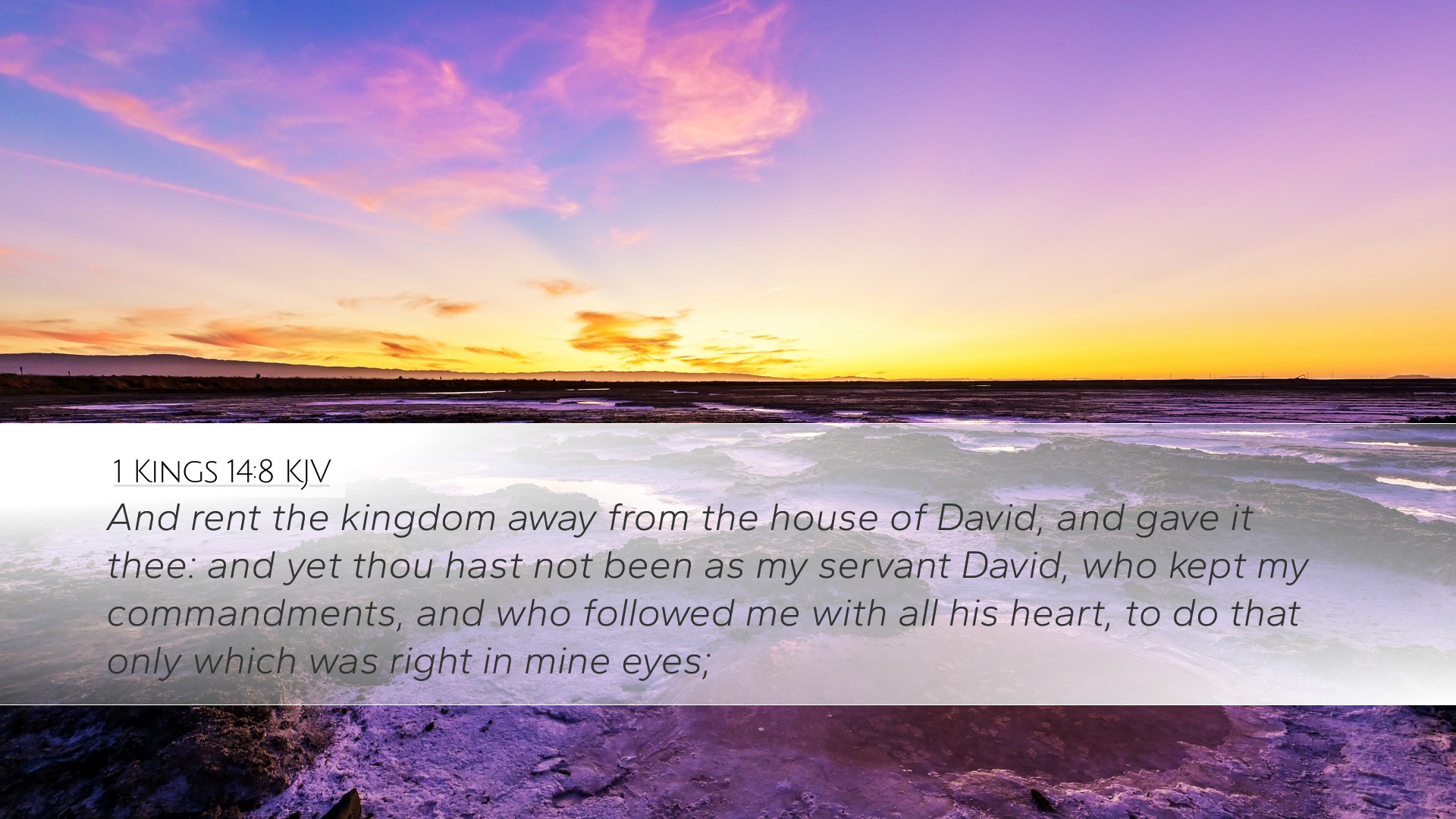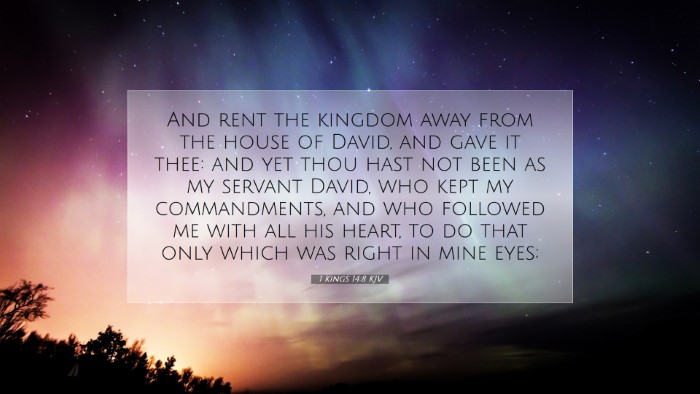Commentary on 1 Kings 14:8
Verse: "And tore the kingdom away from the house of David, and gave it to you; and yet you have not been as My servant David, who kept My commandments and who followed Me with all his heart, to do only what was right in My eyes." (1 Kings 14:8 NKJV)
Introduction
The verse of 1 Kings 14:8 stands as a pivotal moment in the narrative of the divided kingdom of Israel. It reflects God’s judgment against Jeroboam, reminding us of divine sovereignty and the serious nature of covenantal faithfulness. As several public domain commentaries elucidate, this passage is rich with theological insights, applicable both historically and in contemporary faith practice.
Contextual Analysis
This verse comes at a critical juncture where Jeroboam, who was appointed to reign over the northern tribes, is being rebuked for his failure to uphold God’s commandments. The historical backdrop involves the political ramifications of Jeroboam's reign and the establishment of worship practices that diverged from the mosaical law.
Historical Background
Jeroboam, the son of Nebat, was originally a servant of Solomon but rose to prominence in the wake of Solomon’s idolatry and the consequent division of the kingdom. The death of Solomon marks the transition, wherein Jeroboam's ascension is both a result of divine will and a demonstration of human failure.
Theological Insights
Divine Sovereignty and Judgment
According to Matthew Henry, the tearing away of the kingdom from David's house showcases God’s sovereignty. God’s unilateral action in establishing Jeroboam as king underscores His authority over nations and rulers. This serves as a reminder to contemporary believers of God’s active governance in worldly affairs.
Covenantal Faithfulness
Albert Barnes emphasizes the contrast between Jeroboam's unfaithfulness and David's devotion. David is cited as a model king not just for his righteous acts but for his heartfelt obedience to God. This juxtaposition invites reflection among believers on the importance of personal integrity and adherence to God’s commands. Jeroboam's failure reflects a broader theological theme concerning the covenant and its liabilities.
Lessons on Leadership
Adam Clarke notes that leadership in Israel came with considerable spiritual responsibility. Jeroboam's leadership failed not because of external pressures but due to internal disobedience. His decision to establish alternative worship—such as the golden calves—was a direct violation of God's command. This raises questions for modern leaders about the influences they allow in their guidance.
Application to Contemporary Faith
The passage finds resonance in modern theology as it invites reflections on the nature of leadership, faithfulness, and divine judgment. The harsh reality in Jeroboam's punishment prompts believers to examine their own fidelity to God's commands.
Faithful Stewardship
Christian leaders today can draw parallels between their roles and that of Jeroboam. The call to uphold righteousness amidst external and internal temptations remains pertinent. The text urges leaders to consider the weight of their choices on their communities and to strive to imitate David in fervent obedience.
Spiritual Integrity
For individual believers, the text serves as a reminder of the importance of spiritual integrity. Jeroboam's life illustrates the dangers of compromising faith for political expediency or personal gain. Believers are encouraged to examine their alignment with God’s expectations as they navigate their own life choices.
Conclusion
1 Kings 14:8 offers rich theological reflections regarding leadership, faithfulness, and God's sovereignty. The lessons derived from Jeroboam's reign stand as warnings and encouragements for today's believers. As we observe God’s dealings with His people through the kings of Israel, let us strive to be like David, pursuing a heart wholly devoted to God’s commandments.
Summary Points
- Divine Sovereignty: God’s authority over nations and rulers is paramount.
- Covenantal Faithfulness: Comparison between Jeroboam and David highlights the necessity of integrity.
- Leadership Responsibility: Leaders are called to spiritual diligence amidst complications.
- Personal Reflection: Each believer must consider their faithfulness to God's expectations.


